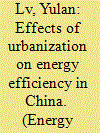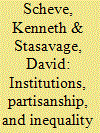| Srl | Item |
| 1 |
ID:
177127


|
|
|
|
|
| Summary/Abstract |
Energy efficiency in China has been the cause for increasing concern for national and local sustainable development due to rapid economic development and large-scale energy consumption. Using panel data of 30 provinces between 1997 and 2016 in China, the measurement of energy efficiency is disentangled, and the effects of urbanization on different types of energy efficiency are explored. First, the measurement of energy efficiency is disentangled, with long-run and short-run efficiencies derived. Results of energy efficiency scores highlight the predominant status of long-run inefficiency is low and that disparate energy efficiency is present between provinces. Second, the effects of urbanization were found to be significantly negative on short-run, long-run and overall energy efficiency. Comparatively, the effect of urbanization on long-run efficiency was shown to have recently grown, implying an urgent call for energy conservation during rapid urbanization. Finally, this study outlines broader implications and suggests policies to improve energy efficiency. Here, application of energy conservation technology, industrial structure upgrading and efficiency information disclosure to urban residents are thought to be smart ways to improve energy efficiency.
|
|
|
|
|
|
|
|
|
|
|
|
|
|
|
|
| 2 |
ID:
087045


|
|
|
|
|
| Publication |
2009.
|
| Summary/Abstract |
It has been widely suggested by political scientists and economists, based on empirical evidence for the period since 1970, that the institution of centralized wage bargaining and the presence of a government of the left are associated with lower levels of income inequality. The authors make use of new data on top income shares as well as long-run series on wage inequality to examine the effects of partisanship and wage bargaining over a much longer time period, nearly the entire twentieth century. Their empirical results provide little support for the idea that either of these two factors is correlated with income inequality over this period. They then show that a closer look at the introduction of centralized wage bargaining in individual countries during the middle part of the twentieth century reveals that in countries that moved to centralize wage bargaining, income inequality had already been trending downward well before the institutional change, that the move to centralized bargaining did not alter this trend, and that these changes in income inequality were also observed in countries that did not adopt centralized wage bargaining at this time. The results suggest that there were alternative institutional paths to reduced income inequality during most of the twentieth century. This raises the possibility that either structural economic changes or commonly shared economic and political events, such as world wars and economic crises, may ultimately be more important for understanding the evolution of income inequality than are the institutional or partisan characteristics commonly considered to be decisive by political scientists.
|
|
|
|
|
|
|
|
|
|
|
|
|
|
|
|